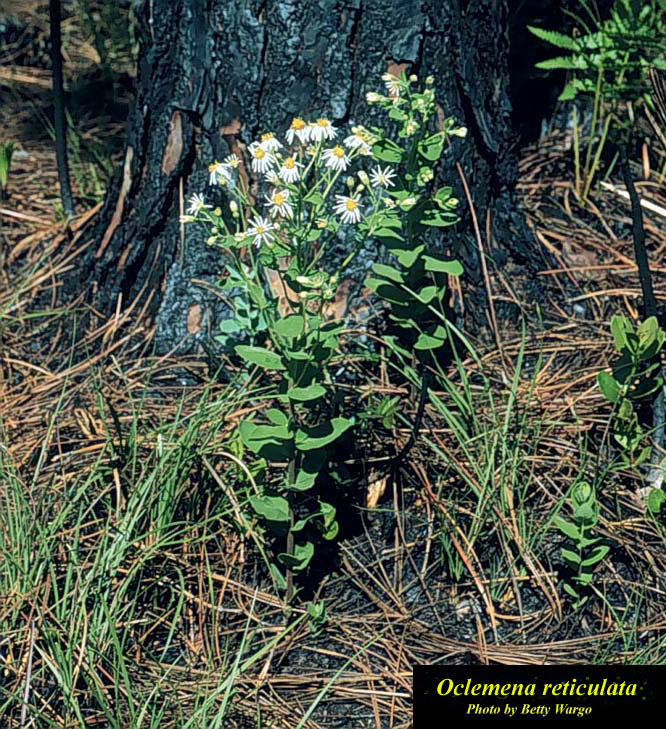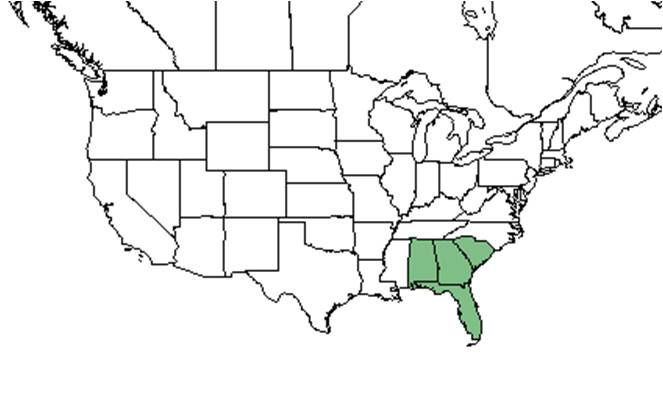Difference between revisions of "Oclemena reticulata"
KatieMccoy (talk | contribs) (→References and notes) |
|||
| Line 3: | Line 3: | ||
{{taxobox | {{taxobox | ||
| name = Oclemena reticulata | | name = Oclemena reticulata | ||
| − | | image = | + | | image = Ocle_reti.jpg |
| − | | image_caption = | + | | image_caption = Photo by Betty Wargo, [http://www.florida.plantatlas.usf.edu/Plant.aspx?id=2355&display=photos Atlas of Florida Vascular Plants] |
| regnum = Plantae | | regnum = Plantae | ||
| divisio = Magnoliophyta - Flowering plants | | divisio = Magnoliophyta - Flowering plants | ||
Revision as of 17:09, 1 February 2016
| Oclemena reticulata | |
|---|---|

| |
| Photo by Betty Wargo, Atlas of Florida Vascular Plants | |
| Scientific classification | |
| Kingdom: | Plantae |
| Division: | Magnoliophyta - Flowering plants |
| Class: | Magnoliopsida – Dicotyledons |
| Order: | Asterales |
| Family: | Asteraceae ⁄ Compositae |
| Genus: | Oclemena |
| Species: | O. reticulata |
| Binomial name | |
| Oclemena reticulata (Pursh) G.L. Nesom | |

| |
| Natural range of Oclemena reticulata from USDA NRCS Plants Database. | |
Common name: pine barren whitetop aster
Contents
Taxonomic notes
Description
A description of Oclemena reticulata is provided in The Flora of North America.
Distribution
Ecology
Habitat
In the Coastal Plain in Florida and Georgia, O. reticulata has been found in wet pine flatwoods, pine/saw palmetto flatwoods, oak/palmetto scrubs, boggy wiregrass pine flatwoods, and ecotones between cypress swamps and pine flatwoods. It can be found in disturbed areas such as powerline corridors, cutover wet pinewoods and pasture edges (FSU Herbarium). Soil types include loamy sand, sandy peat, and sandy loam (FSU Herbarium). Associated species include Sphagnum and cinnamon fern (FSU Herbarium).
Phenology
Flowers and fruits have been observed March through October (FSU Herbarium).
Seed dispersal
Seed bank and germination
Fire ecology
Pollination
The following Hymenoptera families and species were observed visiting flowers of Oclemena reticulata at Archbold Biological Station (Deyrup 2015):
Apidae: Apis mellifera
Megachilidae: Dianthidium floridiense
Use by animals
Diseases and parasites
Conservation and Management
Cultivation and restoration
Photo Gallery
References and notes
Deyrup, M.A. and N.D. 2015. Database of observations of Hymenoptera visitations to flowers of plants on Archbold Biological Station, Florida, USA.
Florida State University Robert K. Godfrey Herbarium database. URL: http://herbarium.bio.fsu.edu. Last accessed: October 2015. Collectors: Loran C. Anderson, Andre F. Clewell, George R. Cooley, R.F. Doren, Bob Fewster, A. Gholson Jr., R.K. Godfrey, Norlan C. Henderson, S.C. Hood, C. Jackson, Nancy E. Jordan, M. Knott, R. Komarek, Robert Kral, S.W. Leonard, Sidney McDaniel, Marc Minno, Grady W. Reinert, J. Semple, Cecil R. Slaughter, Joe Sparling, L.B. Trott, Kenneth A. Wilson, Carroll E. Wood. States and Counties: Florida: Bradford, Calhoun, Clay, Columbia, Duval, Flagler, Franklin, Gulf, Hamilton, Hardee, Hernando, Highlands, Hillsborough, Holmes, Jackson, Lake, Leon, Liberty, Nassau, Orange, Osceola, Pasco, Pinellas, Polk, Putnam, St. Johns, Taylor, Union, Wakulla, Walton. Georgia: Thomas. Compiled by Tall Timbers Research Station and Land Conservancy.